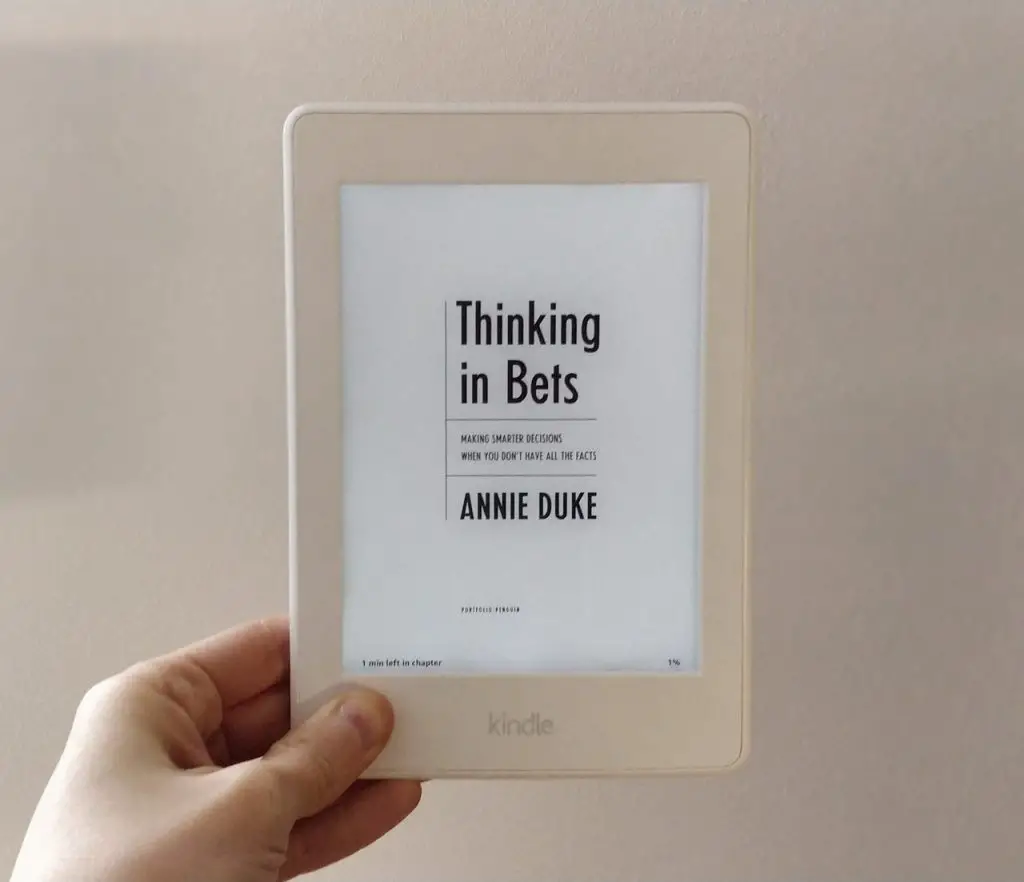How to Start Thinking in Bets & Improve Your Decision-Making Process [Best Books of 2018]
Dec 07, 2018 | Posted by Cristina in Newsletters
 As you know, I avoid books that just got out and were written by authors I haven’t read before. I’d rather wait for the hype to pass and decide afterwards if they’re still worthy of my time – usually, the answer is no. The book I want to talk to you about today was an exception from that rule.
As you know, I avoid books that just got out and were written by authors I haven’t read before. I’d rather wait for the hype to pass and decide afterwards if they’re still worthy of my time – usually, the answer is no. The book I want to talk to you about today was an exception from that rule.
Annie Duke’s “Thinking in Bets: Making Smarter Decisions When You Don’t Have All the Facts” was released this year, in February, and I read it right away.
She’s been on my radar thanks to Tribe of Mentors, and a talk with James Altucher convinced me to go ahead and buy her book. I didn’t regret it (obviously, otherwise you wouldn’t be reading this 😛 ).
If you’re familiar with the poker world, you’ve probably heard about Annie Duke before, or at least the scandal that involved her brother, Howard Lederer, co-founder of the Full Tilt Poker website.
For two decades, Annie was one of the top poker players in the world, and a World Series of Poker champion (2004). Prior to becoming a professional poker player, Annie studied cognitive psychology.
She’s now known as an expert in strategies for smart decision-making, emotional control and embracing uncertainty, topics that she’s been coaching others on since 2002. After she retired from professional poker in 2012, this has been her main work.
This is not Annie’s first book – in fact, it’s her fifth, but it’s the first one written for general audiences. Born at the intersection of her studies in cognitive psychology and what she learned from her experience at the poker table, she developed most of the ideas in this book throughout her years of public speaking and consulting.
Poker is a game of decision-making in a chaotic environment, under uncertainty and luck – as in life, where most of our decisions also involve hidden information and luck. This creates a challenge that doesn’t exist in chess, where the outcomes are more tightly correlated with decision quality.
Good decisions makers are those who are comfortable with the world being unpredictable. They understand that they can’t know exactly how something will turn out, so they embrace uncertainty and incorporate it into their thinking.
“Thinking in Bets” will teach you the discipline of separating the quality of the decisions from the outcomes.
Think of it this way: when they win a hand, most people just assume that it was because they’re freakin’ awesome and they made the right bet. And vice versa: if they lose, they assume they made the wrong bet, or were unlucky.
When we look at results and try to figure out why some things happened, we tend to fall into cognitive traps, assuming causation where there’s only a correlation, and cherry-picking data that will serve our self-narrative.
Annie talks about how to not confuse the right decision with the individual outcome of a single hand, make fewer emotional decisions, be more open-minded and learn how to say some form of “I’m not sure“.
Acknowledging uncertainty can help us shift our mindset. Being wrong becomes just an opportunity to get closer to the truth (or, as David Goggins was saying: failure is just a word for getting more information). It can also help us redefine success and failure around making good decisions that will win in the long run.
Three practical ideas from the book:
1. Build the habit of testing alternative perspectives every time we need to make a decision, no matter how small. Practice behaving as if we have something at risk and sort the outcomes into skill and luck buckets. “Making better decisions stops being about wrong or right, but about calibrating among all the shades of grey.”
2. Seek out dissenting opinions. Build a group of people who’ll disagree with you, come with differing ideas and play the devil’s advocate (this is similar to what Ray Dalio’s saying in Principles).
3. Try to change your mind about one thing every day and become better at being wrong. “There is no sin in finding out there is evidence that contradicts what we believe. The only sin is in not using that evidence as objectively as possible to refine that belief going forward.”
I’m aware of the poker world controversy that surrounds Annie and her brother, and I still think this is a good book on making better decisions, with lessons that reminded me of what I learned from stoicism.
However, if you’re not yet convinced whether you should read it or not, at least give a chance to her conversation with James Altucher from back in February, there’s a lot to learn from it: The Fastest Way to Become an Expert at Anything – this is the podcast episode that convinced me to buy and read the book.
And if you want to dig deeper into the subject, pair Annie’s Thinking in Bets with The Black Swan, a book on uncertainty and human nature, written by one of my favorite authors, Nassim Nicholas Taleb.
P.S. this text is an extract from one of our newsletters. If you enjoyed it, please subscribe here.